Our Verdict

To help you make an informed decision, here’s a recommendation after a thorough comparison of Zoho Books and Neat. Zoho Books is the superior choice for most small to medium-sized businesses. While Neat shines in document management and expense tracking, Zoho Books offers a more comprehensive set of features that better address a wider range of accounting needs. For a well-rounded accounting solution that handles a broader range of financial tasks, Zoho Books is the clear winner.
Ultimately, you will find better value for money, greater scalability, and a more comprehensive feature set with Zoho Books, making it the top choice in this comparison for most small to medium-sized businesses seeking a full-featured accounting solution.
Why Choose Zoho Books

Zoho Books provides robust invoicing, inventory management, project tracking, and financial reporting capabilities. This versatility allows it to grow with your business. Its user-friendly interface, strong mobile app, and affordable pricing make it accessible to businesses of various sizes and industries.
Who Zoho Books Is Best For
Zoho Books is an ideal solution because it:
- Targets small to medium-sized businesses
- Supports service-based businesses
- Integrates with other zoho products
- Enhances invoicing capabilities
- Manages inventory
- Provides an affordable QuickBooks alternative
- Supports multi-currency transactions
- Leverages strong mobile capabilities
Who Zoho Books Is Not Right For
Zoho didn’t tick all the boxes? Avoid Zoho if you:
- Serve large enterprises
- Meet advanced inventory management needs
- Accommodate extensive customization requirements
- Integrate directly with many third-party apps
- Specialize in document management
>>> MORE: Zoho Books vs NetSuite
Why Choose Neat

Although Neat excels in document organization and expense tracking, its limited accounting capabilities means you will likely need additional software in the future. If your primary focus is on document management and expense tracking, especially if you already use QuickBooks or TurboTax, Neat could still be a valuable tool.
Who Neat Is Best For
Go for this option because it:
- Serves small businesses and solopreneurs
- Handles high volume of receipts and bills
- Leverages strong mobile capture capabilities
- Streamlines tax preparation
- Reduces paper clutter
- Simplifies expense reconciliation
Who Neat Is Not Right For
Neat is not for you nor your organization if you want to:
- Address comprehensive accounting needs
- Provide advanced financial reporting
- Include inventory management needs
- Support invoicing capabilities
- Enable multi-user collaboration
- Offer extensive third-party app integrations
Zoho Books vs Neat Accounting: Main Differences
Here, Zoho Books emerges as the stronger option for most businesses.
| Zoho | Neat |
Ideal For | Zoho Books is ideal for small to medium-sized businesses looking for a comprehensive accounting solution. It caters well to service-based businesses, companies using other Zoho products, and organizations needing features like inventory management and multi-currency support. Zoho Books is particularly well-suited for businesses that have outgrown basic bookkeeping software but don’t need the complexity of enterprise-level accounting systems.
| Neat, on the other hand, is ideal for small businesses and solopreneurs who prioritize efficient document management and expense tracking. It’s particularly well-suited for businesses dealing with a high volume of receipts and bills, needing strong mobile capture capabilities, and companies looking to streamline its tax preparation process. Neat is best for organizations that want to focus on organizing and managing their financial documents rather than handling all aspects of accounting. |
Pricing |
|
|
Integrations | Zoho Books offers a wider range of integrations compared to Neat, although it still has fewer third-party integrations than some competitors like QuickBooks.
Zoho Books integrates seamlessly with other Zoho applications, providing a comprehensive business management ecosystem. It also offers integrations with popular payment gateways, e-commerce platforms, and some third-party apps. However, the number of third-party integrations is limited compared to some competitors. | Neat has a much more limited set of integrations. Its primary integrations are with QuickBooks and TurboTax, which are powerful connections for businesses using these Intuit products. However, beyond these, Neat offers very few integrations with other business software including H&R Block, Quicken Intuit, Microsoft Outlook, Campaign Monitor, Mailchimp, Contacts and Constant Contact. |
Standout Features | Zoho Books stands out for its comprehensive accounting features, including robust invoicing, inventory management, project tracking, and financial reporting. It offers multi-currency support, automated workflows, and a user-friendly interface. The mobile app is also particularly strong, allowing users to perform a wide range of accounting tasks on the go. | Neat’s standout features revolve around document management and expense tracking. It excels in receipt capture and organization, offering multiple ways to upload documents including a mobile app and a dedicated email address. Neat also offers strong expense categorization and reconciliation tools, as well as tax reporting features to help identify potential deductions. |
Zoho Books vs Neat Accounting: Standout Features
Zoho Books stands out with its comprehensive accounting suite, making it the preferred choice if you seek an all-in-one accounting solution.
Zoho Books
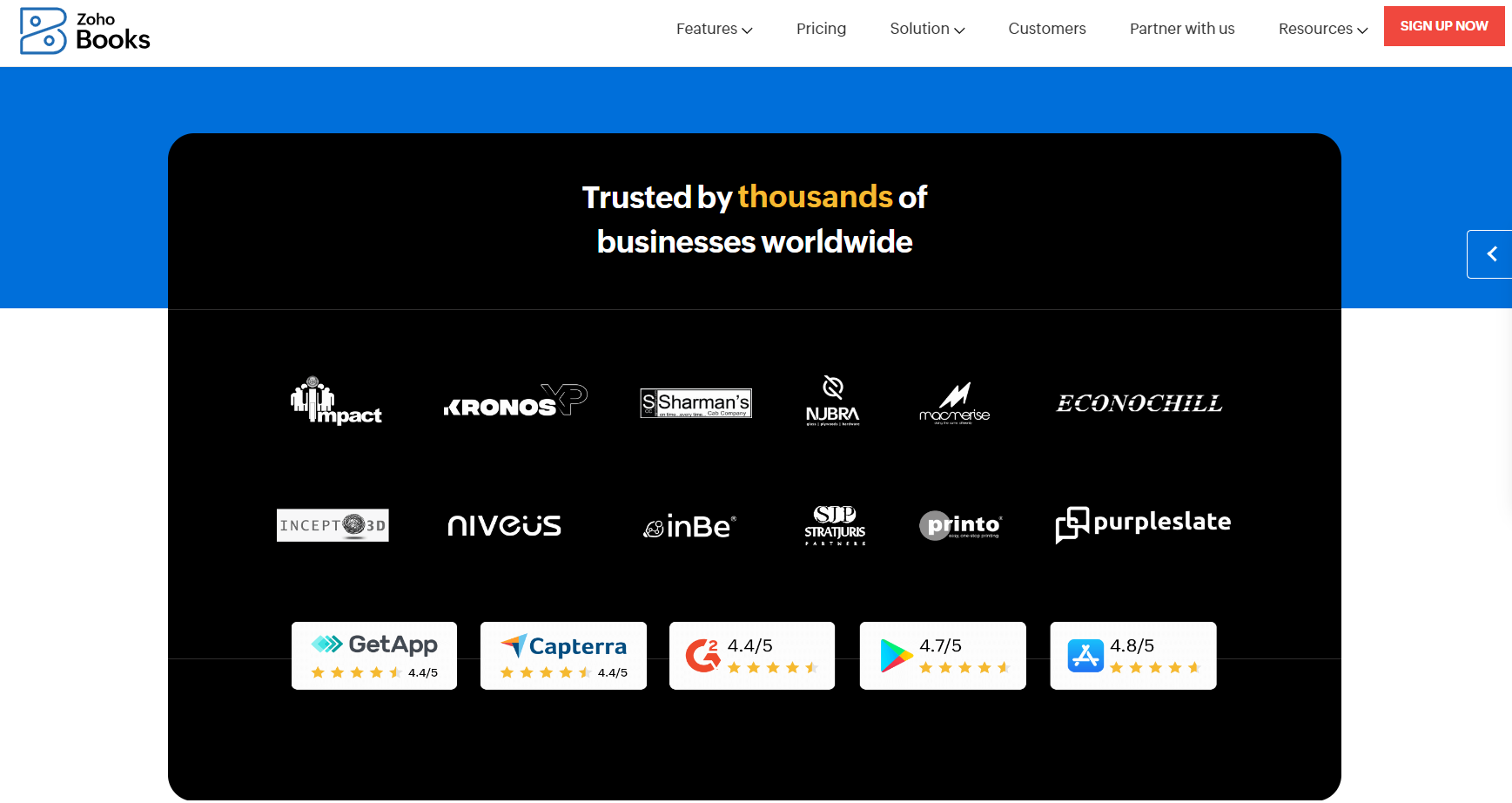
- Delivers a Comprehensive Accounting Suite: Zoho Books offers a full range of accounting features, including double-entry bookkeeping, bank reconciliation, and financial reporting. This makes it a one-stop solution for most small to medium-sized businesses’ accounting needs.
- Enhances Invoicing: Zoho Books provides highly customizable invoices, supports recurring invoices, and offers multiple templates. You can also set up automated payment reminders and late fees.
- Manages Inventory Efficiently: The software includes features for tracking inventory levels, setting reorder points, and creating purchase orders. This is particularly useful for retail and e-commerce businesses.
- Tracks Project Time: Zoho Books allows you to track time spent on projects, bill clients based on tracked time, and analyze project profitability. This feature is especially valuable for service-based businesses.
- Supports Multi-Currency Transactions: The platform can handle transactions in multiple currencies, automatically applying up-to-date exchange rates. This is crucial for businesses dealing with international clients or suppliers.
- Automates Workflows: Zoho Books allows you to set up custom workflows to automate repetitive tasks, improving efficiency and reducing errors.
- Provides a Client Portal: Customers can access their own portal to view invoices, make payments, and check their account status, enhancing client communication and streamlining payment collection.
- Utilizes a Robust Mobile App: The Zoho Books mobile app is feature-rich, allowing you to create and send invoices, record expenses, and access reports on the go.
Neat
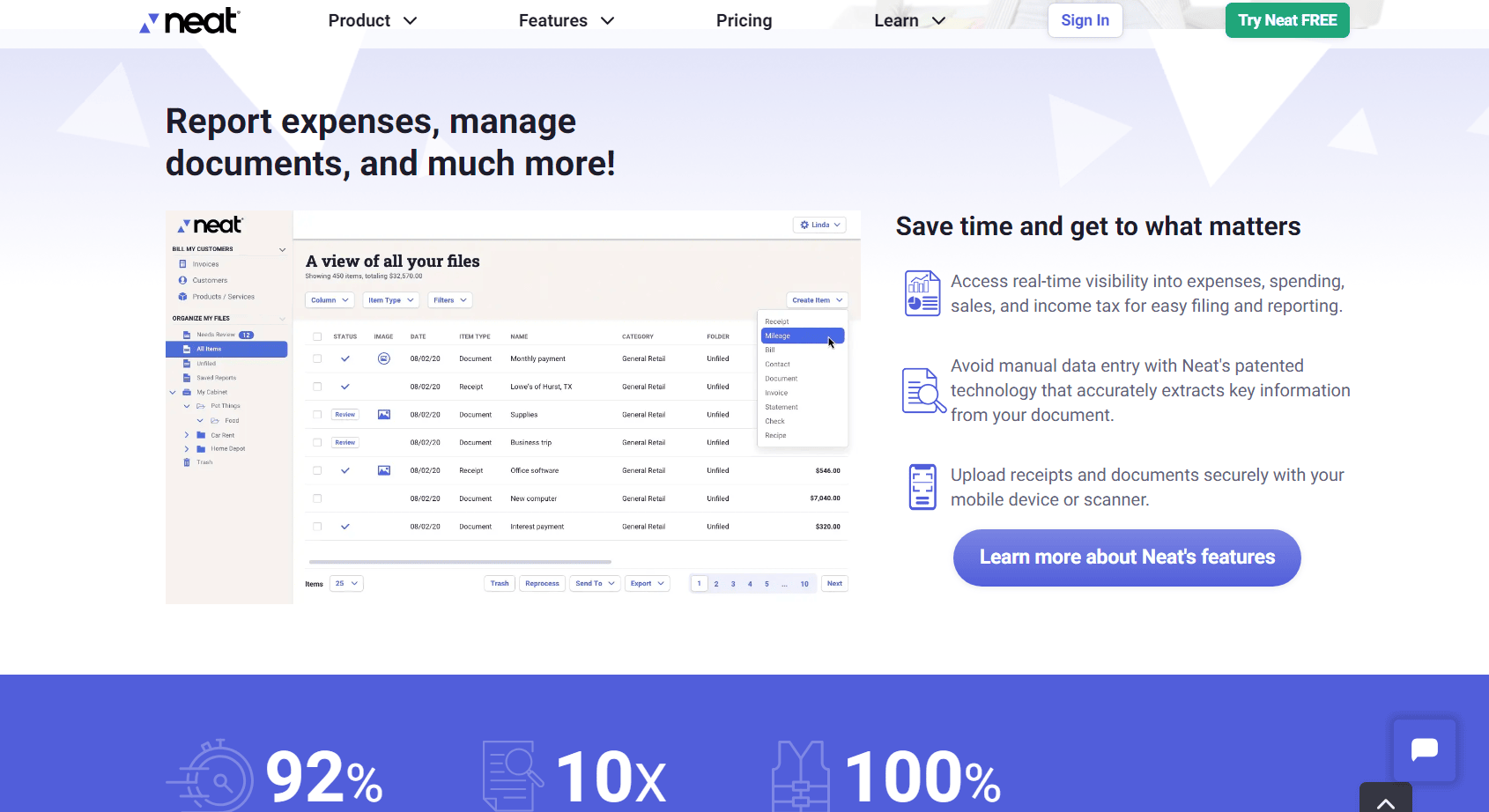
- Offers Multiple Document Upload Options: Neat provides various ways to add documents, including mobile app scanning, email forwarding, desktop upload, and manual entry. This flexibility makes it easy to capture receipts and bills in any situation.
- Organizes Documents Advancedly: Neat offers a folder structure for organizing documents, with the ability to create custom folders and subfolders. This helps you keep financial documents well-organized and easily accessible.
- Utilizes Optical Character Recognition (OCR): Neat uses OCR technology to extract key information from scanned documents, reducing manual data entry and improving accuracy.
- Categorizes Expenses: The software automatically categorizes expenses and allows for custom categorization, making it easier to track spending across different business areas.
- Generates Tax Reports: Neat generates tax category reports to help identify potential tax deductions and creates sales tax reports to simplify tax remittance.
- Integrates with QuickBooks and TurboTax: While Neat has limited integrations overall, its connections with QuickBooks and TurboTax are robust, allowing for seamless data transfer between these platforms.
- Reconciles Expenses: Neat offers a side-by-side view of expenses and bank feed, simplifying the reconciliation process.
- Uses a Custom Email Upload Address: Each Neat account gets a unique email address for forwarding documents, making it easy to capture receipts and bills directly from your email inbox.
Zoho Books vs Neat Accounting: How to Sign Up for Zoho Books
Here’s how to sign up for Zoho Books:
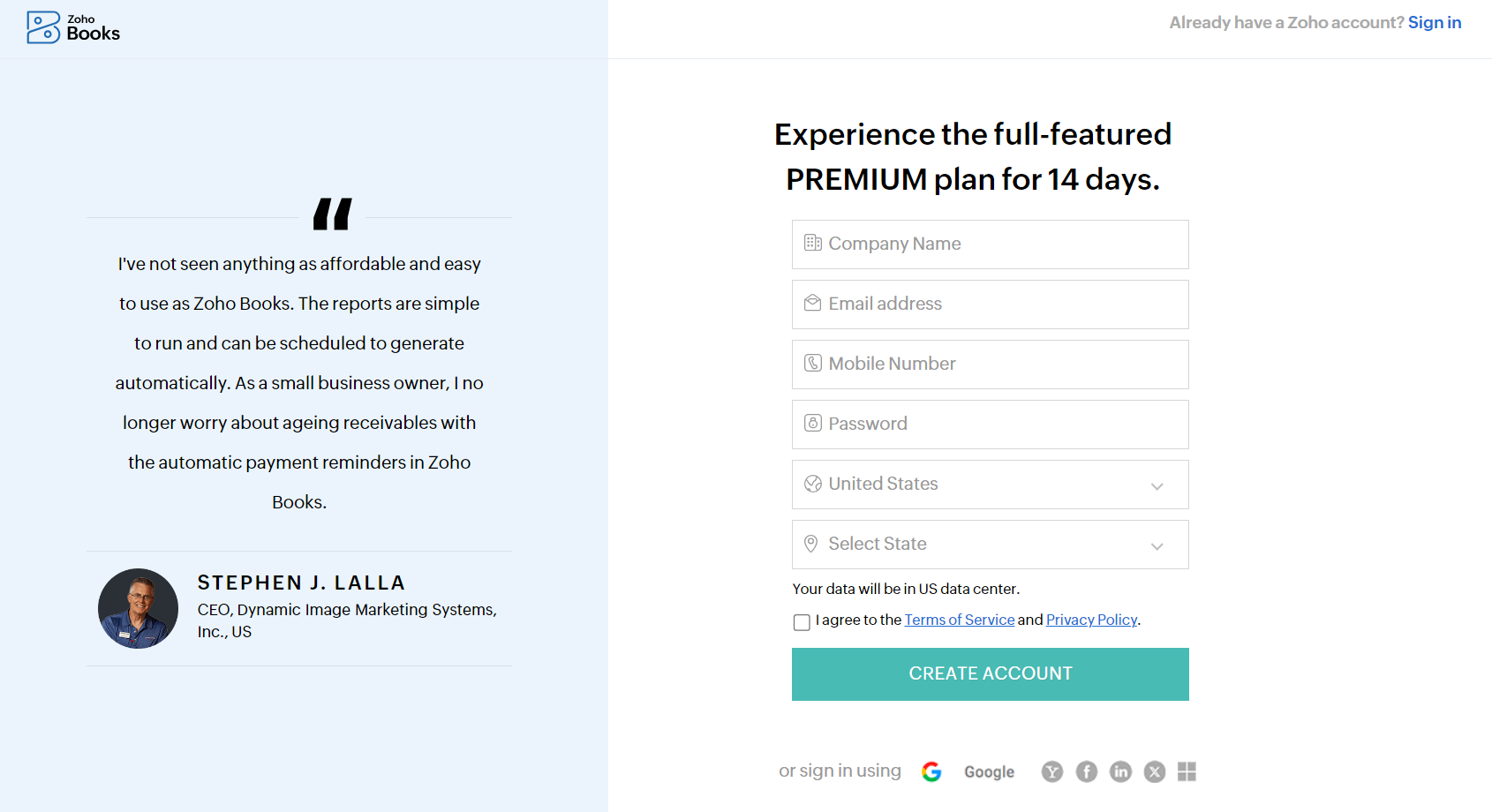
- Visit the Home page of Zoho Books (zoho.com/us/books/signup/)
- Fill in all the necessary details on the page.
- Agree to the terms and conditions.
- Click on “START 14-DAY FREE TRIAL” to begin your trial period with access to all features of the professional plan.
After the 14-day trial:
- Decide whether to continue with a paid plan.
- You can upgrade to the paid plan anytime during the trial or after it ends based on your needs.
Zoho Books vs Neat Accounting: How to Sign Up for Neat
Here are the steps to sign up for Neat:
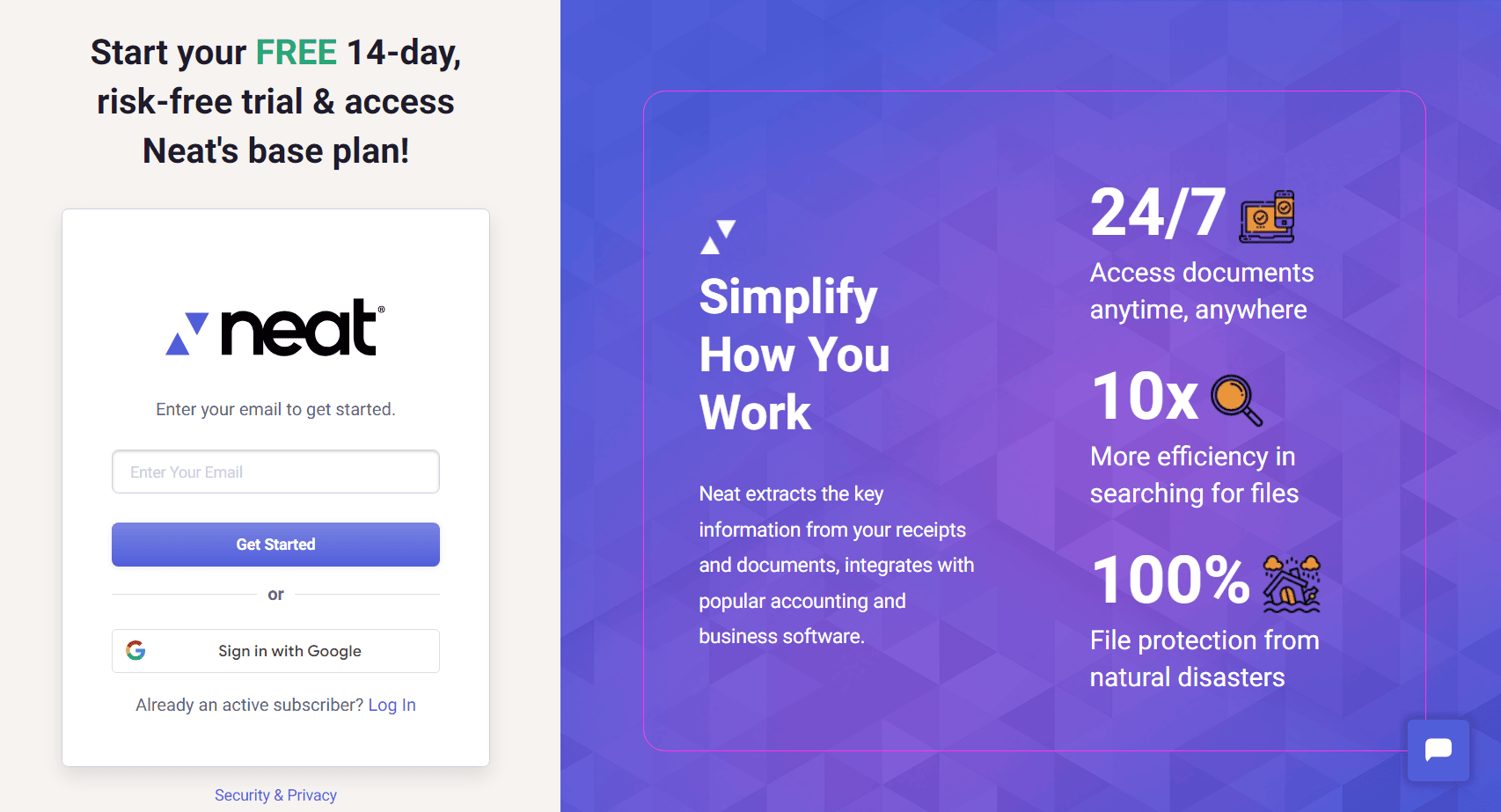
- Visit the Neat website (https://www.neat.com/)
- Click on “Try Neat Free” if you want to start with a trial, or click on “Buy Now” if you prefer to purchase immediately.
- Enter your email or Gmail address to begin the sign-up process.
>>> PRO TIPS: QuickBooks Invoicing vs KashFlow
Zoho Books Pros and Cons
Zoho Books takes the lead due to its robust mobile app, multi-currency support, and customizable workflows.
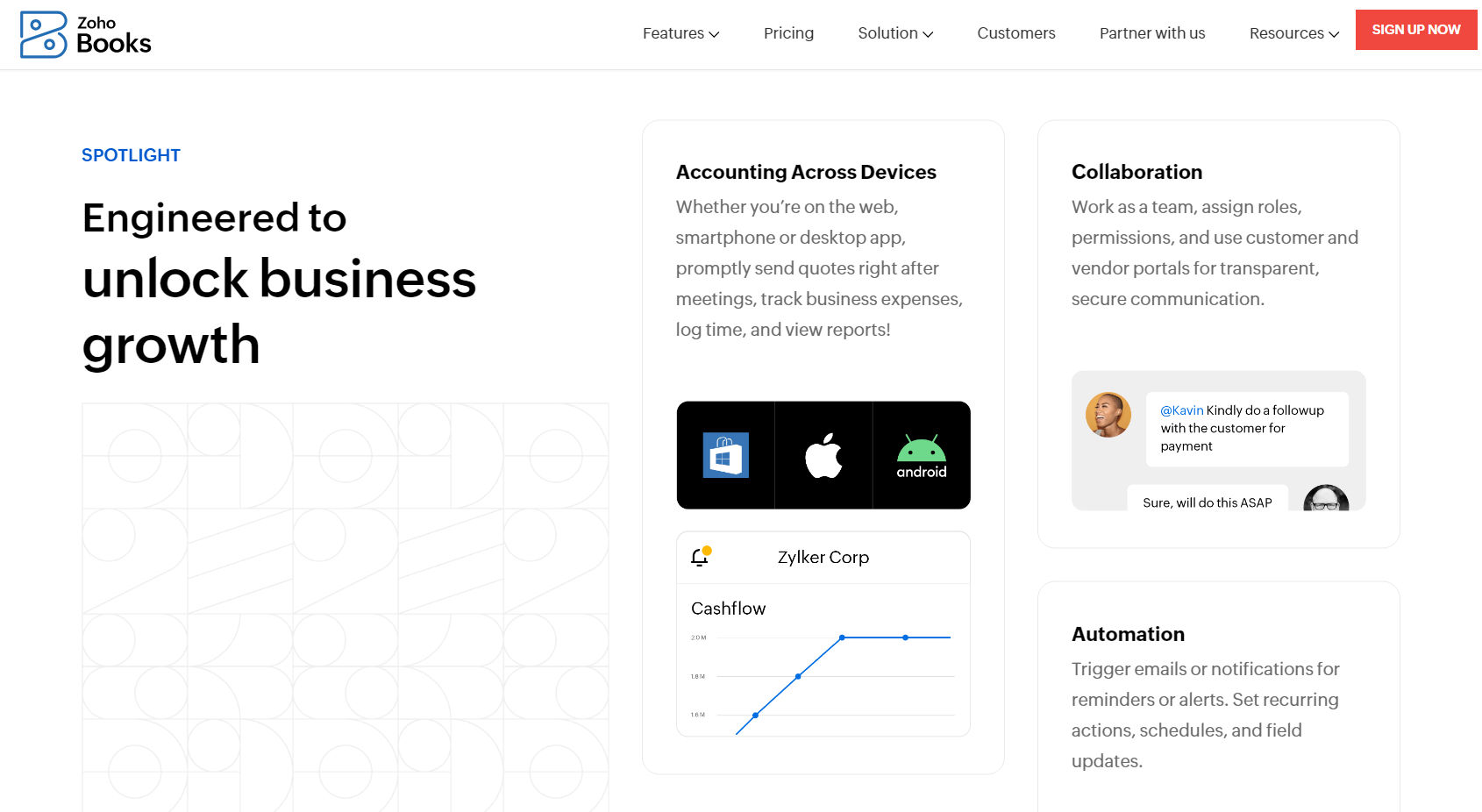
Pros
- Offers comprehensive feature set
- Provides affordable pricing
- Features a user-friendly interface
- Utilizes a strong mobile app
- Offers customizable invoicing
- Supports multi-currency transactions
- Includes automation features
- Integrates with the zoho ecosystem
Cons
- Limits third-party integrations
- Imposes user limits
- Presents a learning curve for advanced features
- Offers limited inventory features
- Excludes built-in payroll
- Have reporting limitations
- Limits scalability
- Provides limited customer support
Pros and Cons of Neat
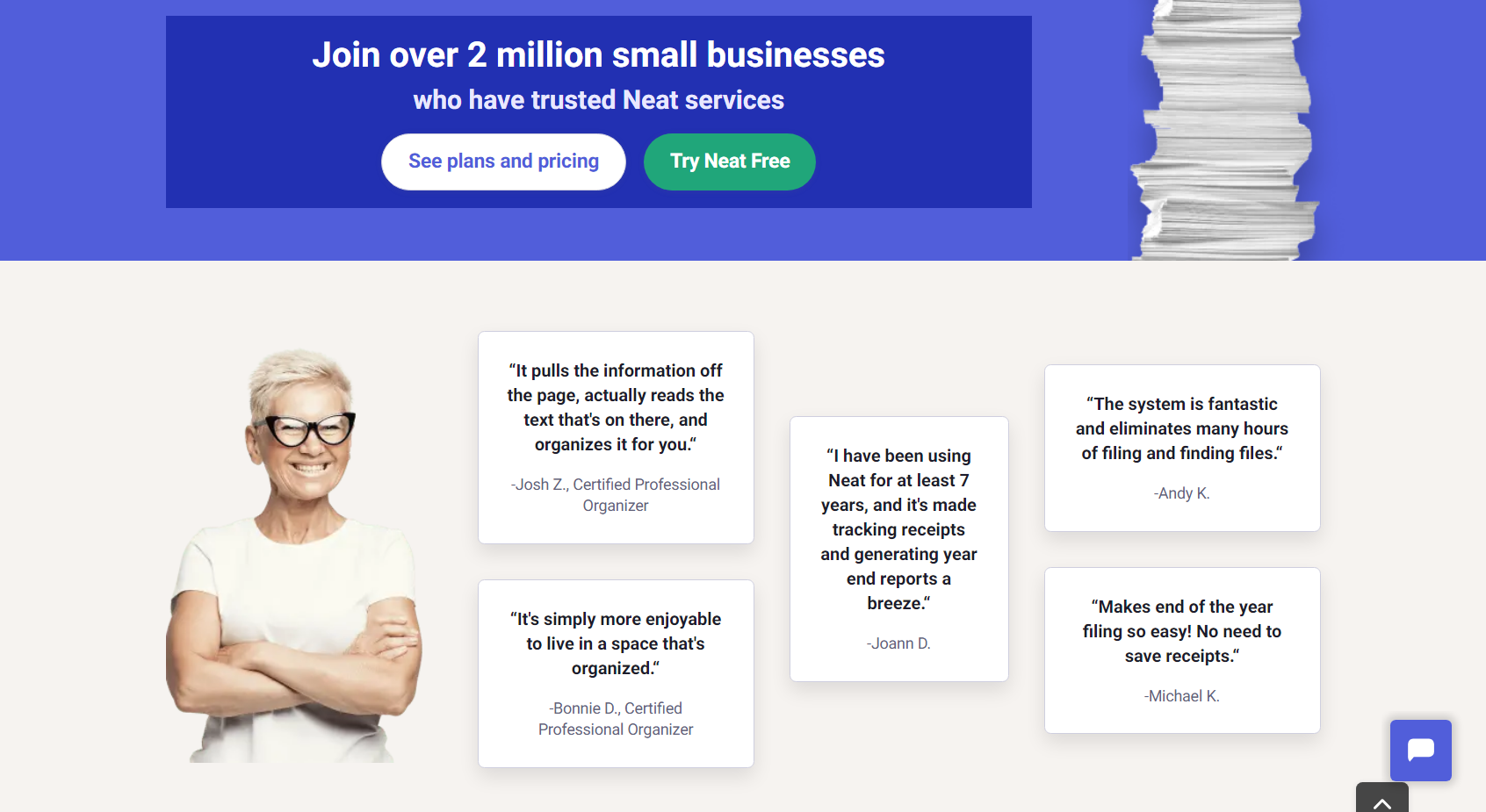
Pros
- Delivers Excellent Document Management
- Utilizes a strong mobile app
- Uses optical character recognition (OCR) technology
- Features a simple user interface
- Integrates with QuickBooks and TurboTax
- Assists with tax preparation
- Offers affordable pricing
- Offers 30-day money back guarantee
- Provides a custom email upload address
Cons
- Lacks comprehensive accounting features
- Integrates few third-party
- Offers no free plan
- Limits scalability
- Excludes direct bill pay
- Provides basic reporting
- Lacks inventory management
- Limits multi-user functionality
Zoho Books vs Neat Accounting: Customer Reviews
Zoho Books and Neat both generally receive positive reviews from users, but they are praised for different aspects reflecting their distinct focuses.
Users frequently praise Zoho Books for its comprehensive feature set and value for money. Many reviewers appreciate the software’s user-friendly interface and the range of accounting tasks it can handle. The mobile app, in particular, receives high marks for its functionality and ease of use, earning a 4.4 rating from Software Advice and 9.1/10 from Business.com. Positive comments often highlight the intuitive interface and ease of use, as well as the comprehensive feature set offered at an affordable price. Negative comments typically relate to the limited third-party integrations and the learning curve associated with some advanced features.
Neat users often commend the software for its document management capabilities and ease of use. The mobile app receives particular acclaim for its receipt scanning functionality. Neat has a 5.7 rating from Techopedia, 4 from Capterra, and 4 from Software Advice. Positive comments frequently mention its helpfulness for tax preparation and time-saving automation features. Negative comments often point to the limited accounting features beyond document management and occasional OCR inaccuracies.
Zoho Books vs Neat Accounting: Competitors
To consider alternatives to Zoho Books and Neat, explore these notable competitors in the accounting and document management software space:
- QuickBooks Online: You’ll find QuickBooks to be one of the most popular accounting solutions, offering a comprehensive set of features tailored for small to medium-sized businesses. It provides more extensive third-party integrations than Zoho Books and more robust accounting features than Neat. Keep in mind, however, that it generally comes at a higher cost than both.
- Xero: When looking for a full-featured accounting solution, Xero stands out with its user-friendly interface and strong collaboration features. You’ll benefit from unlimited users even on its lowest-tier plan, making it an excellent choice if Zoho Books’ user limits are too restrictive for your needs.
- FreshBooks: If you’re a freelancer or run a small service-based business, FreshBooks offers strong invoicing and time-tracking features. It’s a great alternative to Zoho Books, especially if your business requires these specific functionalities.
- Receipt Bank: If you seek an alternative to Neat, Receipt Bank excels in automated bookkeeping through receipt and invoice capture. You’ll appreciate its strong integrations with various accounting software, streamlining your document management processes.
>>> GET SMARTER: Zoho Books vs Wave
Pro Tips
- Take advantage of free trials
- Consider scalability
- Evaluate integration needs
- Don’t overlook mobile capabilities
- Consider your comfort with technology
- Assess customer support options
- Think about document management needs
Recap
Zoho Books and Neat serve different primary purposes for small businesses, each excelling in their respective domains. Zoho Books is a comprehensive accounting solution ideal for small to medium-sized businesses needing invoicing, expense tracking, inventory management, and financial reporting. Neat specializes in document management and expense tracking, capturing, organizing, and storing financial documents efficiently.
Zoho Books offers robust accounting features and scalability, while Neat provides superior document management with OCR technology and tax preparation capabilities. Choosing between them depends on your primary needs: Zoho Books for full accounting solutions and Neat for document and expense management. These tools can also complement each other, providing comprehensive support for financial management and growth.













